- Boko Haram's aim is to impose strict enforcement of Sharia law in Nigeria
- The name translates to "Western education is sin"
- The group was founded 12 years ago by Mohammed Yusuf, a charismatic cleric
- Nigerian police killed him in 2009 in an incident captured on video and posted online
(CNN) -- Boko Haram's lethality is indisputable.
The militant group has bombed schools, churches and mosques; kidnapped women and children; and assassinated politicians and religious leaders alike.
It made headlines again recently with the abduction of 230 schoolgirls in the town of Chibok in northeastern Nigeria. After a fierce gunbattle with soldiers, the militants herded the girls out of bed and onto buses, and sped off. Only a few dozen of the girls have escaped.
What exactly is Boko Haram, and why has it turned into a Nigerian synonym for fear and bloodshed?

 A video of Abubakar Shekau, who claims to be the leader of the Nigerian Islamist extremist group Boko Haram, is shown on September 25, 2013. Boko Haram is an Islamist militant group waging a campaign of violence in northern Nigeria. The group's ambitions range from the stricter enforcement of Sharia law to the total destruction of the Nigerian state and its government. Click through to see recent bloody incidents in this strife-torn West African nation:
A video of Abubakar Shekau, who claims to be the leader of the Nigerian Islamist extremist group Boko Haram, is shown on September 25, 2013. Boko Haram is an Islamist militant group waging a campaign of violence in northern Nigeria. The group's ambitions range from the stricter enforcement of Sharia law to the total destruction of the Nigerian state and its government. Click through to see recent bloody incidents in this strife-torn West African nation: 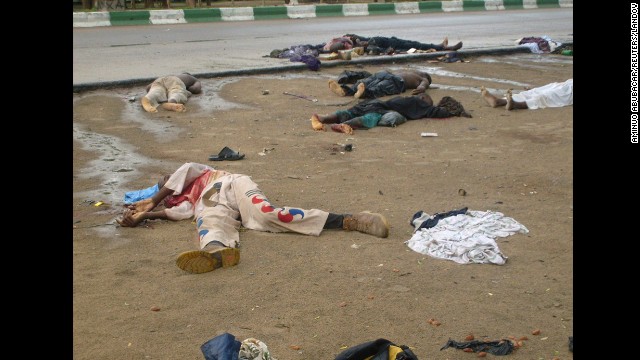 Bodies lie in the streets in Maiduguri after religious clashes in northern Nigeria, on July 31, 2009. Boko Haram exploded onto the national scene in 2009 when 700 people were killed in widespread clashes across the north between the group and the Nigerian military.
Bodies lie in the streets in Maiduguri after religious clashes in northern Nigeria, on July 31, 2009. Boko Haram exploded onto the national scene in 2009 when 700 people were killed in widespread clashes across the north between the group and the Nigerian military.  An unidentified official displays burned equipment inside a prison in Bauchi on September 9, 2010, after the prison was attacked by suspected members of Boko Haram on September 7. About 720 inmates escaped during the prison break, and police suspect the prison was attacked because it was holding 80 members of the sect.
An unidentified official displays burned equipment inside a prison in Bauchi on September 9, 2010, after the prison was attacked by suspected members of Boko Haram on September 7. About 720 inmates escaped during the prison break, and police suspect the prison was attacked because it was holding 80 members of the sect. 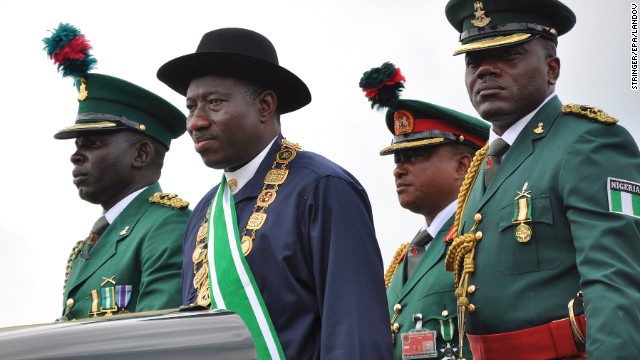 Nigerian President Goodluck Jonathan, second from left, stands on the back of a vehicle after being sworn-in as President during a ceremony in the capital of Abuja on May 29, 2011. In December 2011, Jonathan declared a state of emergency in parts of the country afflicted by violence from the militant Islamist group.
Nigerian President Goodluck Jonathan, second from left, stands on the back of a vehicle after being sworn-in as President during a ceremony in the capital of Abuja on May 29, 2011. In December 2011, Jonathan declared a state of emergency in parts of the country afflicted by violence from the militant Islamist group.  Rescue workers evacuate a wounded person from a U.N. building in Abuja on August 26, 2011. The building was rocked by a bomb that killed at least 23 people, leaving others trapped and causing heavy damage. Boko Haram had claimed responsibility for the attack in which a Honda packed with explosives rammed into the U.N. building, shattering windows and setting the place afire.
Rescue workers evacuate a wounded person from a U.N. building in Abuja on August 26, 2011. The building was rocked by a bomb that killed at least 23 people, leaving others trapped and causing heavy damage. Boko Haram had claimed responsibility for the attack in which a Honda packed with explosives rammed into the U.N. building, shattering windows and setting the place afire.  A photo taken on November 6, 2011, shows state police headquarters burned by a series of bomb and gun attacks that targeted police stations, mosques and churches in Damaturu on November 4, 2011. Attackers left scores injured -- probably more than 100 -- in a three-hour rampage in the Yobe state city of Damaturu. Sixty-three people died.
A photo taken on November 6, 2011, shows state police headquarters burned by a series of bomb and gun attacks that targeted police stations, mosques and churches in Damaturu on November 4, 2011. Attackers left scores injured -- probably more than 100 -- in a three-hour rampage in the Yobe state city of Damaturu. Sixty-three people died.  Men look at the wreckage of a car after a bomb blast at St. Theresa Catholic Church outside Abuja on December 25, 2011. A string of bombs struck churches in five Nigerian cities, leaving dozens dead and wounded on the Christmas holiday, authorities and witnesses said. Boko Haram's targets included police outposts and churches as well as places associated with "Western influence."
Men look at the wreckage of a car after a bomb blast at St. Theresa Catholic Church outside Abuja on December 25, 2011. A string of bombs struck churches in five Nigerian cities, leaving dozens dead and wounded on the Christmas holiday, authorities and witnesses said. Boko Haram's targets included police outposts and churches as well as places associated with "Western influence." 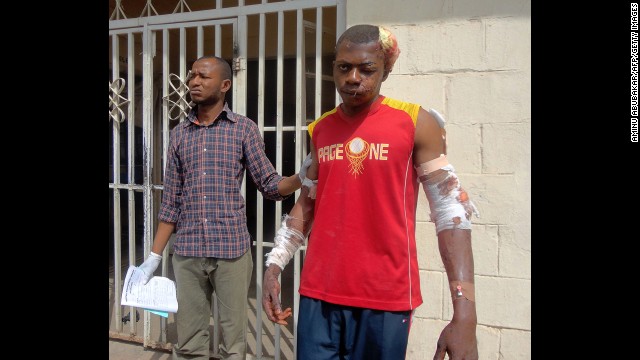 A paramedic helps a young man injured during one of the multiple explosions and shooting attacks as he leaves a hospital in the northern city of Kano on January 21, 2012. A spate of bombings and shootings left more than 200 people dead in Nigeria's second-largest city. Three days later, a joint military task force in Nigeria arrested 158 suspected members of Boko Haram.
A paramedic helps a young man injured during one of the multiple explosions and shooting attacks as he leaves a hospital in the northern city of Kano on January 21, 2012. A spate of bombings and shootings left more than 200 people dead in Nigeria's second-largest city. Three days later, a joint military task force in Nigeria arrested 158 suspected members of Boko Haram. 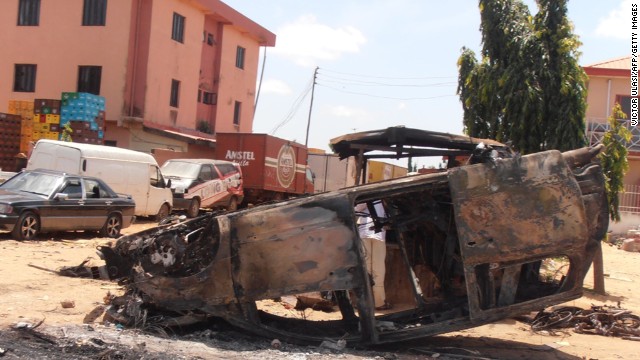 A photo taken on June 18, 2012, shows a car vandalized after three church bombings and retaliatory attacks in northern Nigeria killed at least 50 people on June 17 and injured more than 130 others, the Nigerian Red Cross Society said.
A photo taken on June 18, 2012, shows a car vandalized after three church bombings and retaliatory attacks in northern Nigeria killed at least 50 people on June 17 and injured more than 130 others, the Nigerian Red Cross Society said. 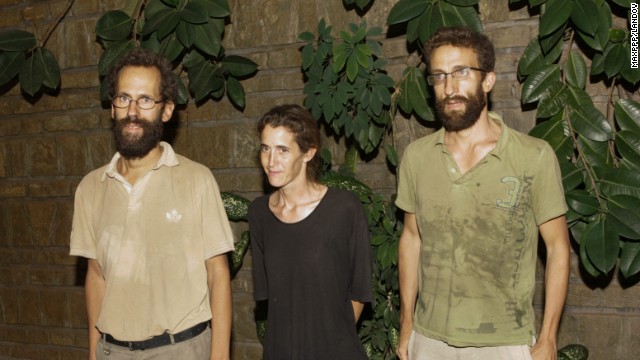 A French family kidnapped on February 19, 2013, in northern Cameroon is released after two months in captivity in Nigeria. The family of four children, their parents and an uncle were kidnapped in Waza National Park in northern Cameroon, situated near the border with Nigeria. One of the captive men read a statement demanding that Nigeria and Cameroon free jailed members of Boko Haram.
A French family kidnapped on February 19, 2013, in northern Cameroon is released after two months in captivity in Nigeria. The family of four children, their parents and an uncle were kidnapped in Waza National Park in northern Cameroon, situated near the border with Nigeria. One of the captive men read a statement demanding that Nigeria and Cameroon free jailed members of Boko Haram.  A soldier stands in front of a damaged wall and the body of a prison officer killed during an attack on a prison in the northeastern town of Bama on May 7, 2013. Two soldiers were killed during coordinated attacks on multiple targets. Nigeria's military says more than 100 Boko Haram militants carried out the attack.
A soldier stands in front of a damaged wall and the body of a prison officer killed during an attack on a prison in the northeastern town of Bama on May 7, 2013. Two soldiers were killed during coordinated attacks on multiple targets. Nigeria's military says more than 100 Boko Haram militants carried out the attack.  A deserted student hostel on August 6, 2013, is shown after gunmen stormed a school in Yobe state, killing 20 students and a teacher, state media reported on July 6, 2013. Boko Haram regularly carries out attacks in Yobe, in Nigeria's northeast.
A deserted student hostel on August 6, 2013, is shown after gunmen stormed a school in Yobe state, killing 20 students and a teacher, state media reported on July 6, 2013. Boko Haram regularly carries out attacks in Yobe, in Nigeria's northeast.  A photograph made available by the Nigerian army on August 13, 2013, shows improvised explosive devices, bomb making materials and detonators seized from a Boko Haram hideout. Gunmen attacked a mosque in Nigeria with automatic weapons on August 11, 2013, killing at least 44 people.
A photograph made available by the Nigerian army on August 13, 2013, shows improvised explosive devices, bomb making materials and detonators seized from a Boko Haram hideout. Gunmen attacked a mosque in Nigeria with automatic weapons on August 11, 2013, killing at least 44 people.  Nigerian students from Jos Polytechnic walk on campus in Jos, Nigeria, on September 30, 2013. Under the cover of darkness, gunmen approached a college dormitory in a rural Nigerian town and opened fire on students who were sleeping. At least 40 students died, according to the News Agency of Nigeria.
Nigerian students from Jos Polytechnic walk on campus in Jos, Nigeria, on September 30, 2013. Under the cover of darkness, gunmen approached a college dormitory in a rural Nigerian town and opened fire on students who were sleeping. At least 40 students died, according to the News Agency of Nigeria.  Soldiers stand outside the 79 Composite Group Air Force base that was attacked earlier in Maiduguri on December 2, 2013. Hundreds of Boko Haram militants attacked an Air Force base and a military checkpoint, according to government officials.
Soldiers stand outside the 79 Composite Group Air Force base that was attacked earlier in Maiduguri on December 2, 2013. Hundreds of Boko Haram militants attacked an Air Force base and a military checkpoint, according to government officials.  Former hostage and French Catholic Priest Georges Vandenbeusch speaks to reporters outside Paris, France, on January 1, after his release. Vandenbeusch was snatched from his parish church in Cameroon on November 13, 2013. Boko Haram claimed responsibility for kidnapping the priest.
Former hostage and French Catholic Priest Georges Vandenbeusch speaks to reporters outside Paris, France, on January 1, after his release. Vandenbeusch was snatched from his parish church in Cameroon on November 13, 2013. Boko Haram claimed responsibility for kidnapping the priest.  A man receives treatment at Konduga specialist hospital after a gruesome attack on January 26. It's suspected that Boko Haram militants opened fire on a village market and torched homes in the village of Kawuri in Borno state, killing at least 45 people.
A man receives treatment at Konduga specialist hospital after a gruesome attack on January 26. It's suspected that Boko Haram militants opened fire on a village market and torched homes in the village of Kawuri in Borno state, killing at least 45 people.  Police officers stand guard in front of the burned remains of homes and businesses in the village of Konduga, in northeastern Nigeria, on February 12. Suspected Boko Haram militants torched houses in the village, killing at least 23 people, according to the governor of Borno state on February 11.
Police officers stand guard in front of the burned remains of homes and businesses in the village of Konduga, in northeastern Nigeria, on February 12. Suspected Boko Haram militants torched houses in the village, killing at least 23 people, according to the governor of Borno state on February 11. 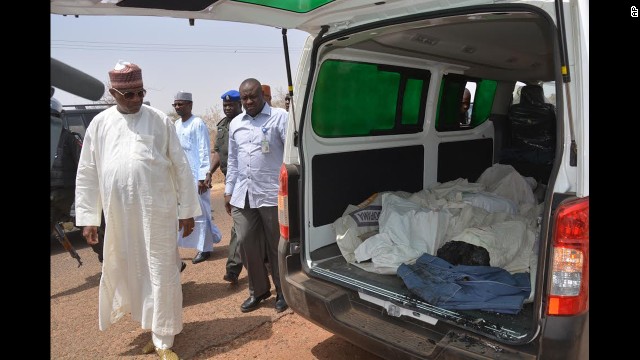 Ibrahim Gaidam, governor of Yobe state, left, looks at the bodies of students inside an ambulance outside a mosque in Damaturu. At least 29 students died in an attack on a federal college in Buni Yadi, near the the capital of Yobe state, Nigeria's military said on February 26. Authorities suspect Boko Haram carried out the assault in which several buildings were also torched. In April as many as 200 girls were abducted from their boarding school in northeastern Nigeria by heavily armed Boko Haram Islamists who arrived in trucks, vans and buses, officials and witnesses said. The group has recently stepped up attacks in the region, and its leader released a video last month threatening to kidnap girls from schools.
Ibrahim Gaidam, governor of Yobe state, left, looks at the bodies of students inside an ambulance outside a mosque in Damaturu. At least 29 students died in an attack on a federal college in Buni Yadi, near the the capital of Yobe state, Nigeria's military said on February 26. Authorities suspect Boko Haram carried out the assault in which several buildings were also torched. In April as many as 200 girls were abducted from their boarding school in northeastern Nigeria by heavily armed Boko Haram Islamists who arrived in trucks, vans and buses, officials and witnesses said. The group has recently stepped up attacks in the region, and its leader released a video last month threatening to kidnap girls from schools. Boko Haram: Nigeria's crisis
Boko Haram: Nigeria's crisis
Boko Haram: Nigeria's crisis
Boko Haram: Nigeria's crisis
Boko Haram: Nigeria's crisis
Boko Haram: Nigeria's crisis
Boko Haram: Nigeria's crisis
Boko Haram: Nigeria's crisis
Boko Haram: Nigeria's crisis
Boko Haram: Nigeria's crisis
Boko Haram: Nigeria's crisis
Boko Haram: Nigeria's crisis
Boko Haram: Nigeria's crisis
Boko Haram: Nigeria's crisis
Boko Haram: Nigeria's crisis
Boko Haram: Nigeria's crisis
Boko Haram: Nigeria's crisis
Boko Haram: Nigeria's crisis
Boko Haram: Nigeria's crisis
Boko Haram: Nigeria's crisis
Boko Haram: Nigeria's crisis
 Boko Haram: Nigeria's crisis
Boko Haram: Nigeria's crisis  Terrorist group abducts Nigerian girls
Terrorist group abducts Nigerian girls  U.S. designates Boko Haram as terrorists
U.S. designates Boko Haram as terrorists  Boko Haram threatens U.S. in video
Boko Haram threatens U.S. in video What does 'Boko Haram' mean?
The name translates to "Western education is sin" in the local Hausa language.
The militant group says its aim is to impose a stricter enforcement of Sharia law across Africa's most populous nation, which is split between a majority Muslim north and a mostly Christian south.
In recent years, its attacks have intensified in an apparent show of defiance amid the nation's military onslaught. Its ambitions appear to have expanded to the destruction of the Nigerian government.
How long has it been around?
The group was founded 12 years ago by Mohammed Yusuf, a charismatic cleric who called for a pure Islamic state in Nigeria. Police killed him in 2009 in an incident captured on video and posted to the Internet.
The crackdown, some say, made Boko Haram more violent and defiant.
Abubakar Shekau took control of the group and escalated the attacks. It murdered and kidnapped Westerners, and started a bombing campaign that targeted churches, mosques and government buildings.
Why not just kill Abubakar Shekau?
One word: elusive.
Questions have swirled about Shekau, including whether he's dead or alive. Even his age is unknown -- estimates range between 35 and 44.
In recent years, the Nigerian military has touted his death, only to retract its claim after he appeared alive and vibrant in propaganda videos.
He uses the alias Darul Tawheed, and analysts describe him as a ruthless loner and master of disguise. He does not speak directly with members, opting to communicate through a few select confidants.
Why would an Islamist militant group target the Muslim north?
Despite its religious fanaticism, Boko Haram does not consider all Muslims as supporters and allies.
There have been suggestions that it attacks certain mosques because members have spoken out against it and helped federal officials with their crackdown. Its attacks are aimed at striking fear at the heart of the local population to prevent cooperation with the government, analysts say.
Does the north support the group?
Although the northern populace mostly abhors the violence, there is considerable local sympathy and support for Sharia law, seen by many as the only way to end what is widely regarded as a corrupt and inept government. Poverty is prevalent in the northern region, and as the military struggles to halt Boko Haram's attacks, the militant group is winning perhaps its most important battle: making Nigerians question government competency.
Rights groups have accused local authorities of human rights violations in the fight against the group, adding to the anti-government sentiment.
What's the West doing to help?
The United States has put a $7 million bounty on Shekau's head. It also designated Boko Haram as a foreign terrorist network last year. Though it has provided technical and financial support to the Nigerian teams battling the insurgency, there has been a reluctance to put boots on the ground unless there's a direct national security threat to the West. Boko Haram's attacks have been limited primarily to Nigeria.
I don't live in Nigeria, so why should I care?
With a population of 175 million, Nigeria is Africa's most populous nation and is considered a political and economic powerhouse in the continent. The key U.S. partner is rich in oil, a major trading partner with China, and is the hub of global business in the region.
And as we've learned with Mali, any unresolved local Islamist insurgency has the potential of spiraling into a world problem.
Last year, Shekau released a statement vowing to attack the United States and Europe.
"Our strength and firepower is bigger than that of Nigeria. Nigeria is no longer a big deal to us, as far as we are concerned. We will now comfortably confront the United States of America," he said.
Does it have ties to al Qaeda?
The U.S. says Boko Haram has links to the al Qaeda affiliate in West Africa and to extremist groups in Mali.
What other attacks has the group conducted?
Just this week, a massive explosion ripped through a bus station in the Nigerian capital, killing at least 71 people. In a video, Shekau said the group was behind the attack.
In November, the group abducted dozens of Christian women, most of whom were later rescued by the military. Some were pregnant or had children, and others had been forcibly converted to Islam and married off to their kidnappers.
In 2011, a Boko Haram suicide attack on the United Nations building in Abuja killed at least 25 people.
A year of attacks linked to Nigeria's Boko Haram
No comments:
Post a Comment